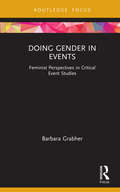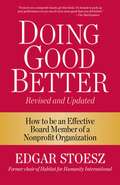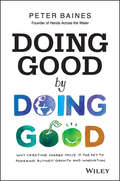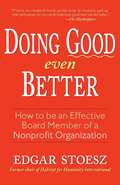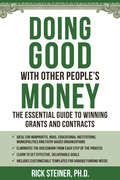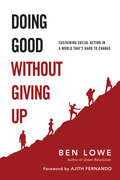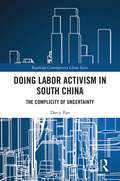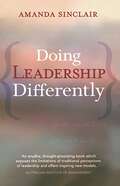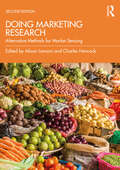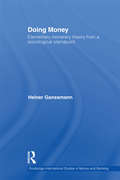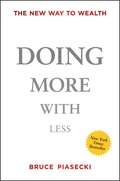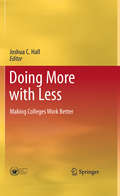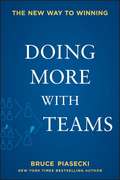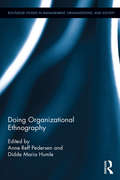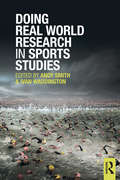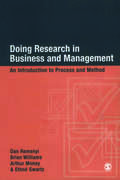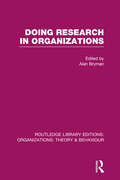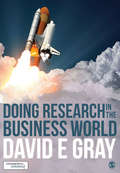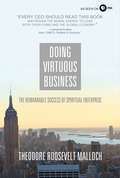- Table View
- List View
Doing Gender in Events: Feminist Perspectives in Critical Event Studies (Routledge Critical Event Studies Research Series.)
by Barbara GrabherExploring the relationship between gender and events, this book delivers an ethnographic analysis of the celebration of gender equality in the context of the culture-led event. Drawing upon Critical Event Studies, Anthropology of the Festive and Gender Studies, this book provides a comprehensive understanding of the entangled, conceptual entities of gender and events. Through a gendered analysis of the culture-led event, Hull UK City of Culture 2017, this work expands epistemological perspectives relevant to the study of events in general and City/ Capital of Culture initiatives in particular. Driven by a feminist, collaborative methodological approach, the book draws on four years of ethnographic, qualitative research in the city of Hull and its celebration of the title, UK City of Culture in 2017 and provides an in-depth analysis of how audiences engage, performances enact, and infrastructures condition the production of cultures of gender equality in the citywide celebration. This will be a valuable resource for upper-level students and academics in the field of Event Studies, Cultural Policy, Geography, Anthropology and Gender Studies.
Doing Good Better: How to be an Effective Board Member of a Nonprofit Organization
by Edgar StoeszThis trusted handbook for nonprofit board service is newly revised and includes new case studies and even more tips and ideas from the trenches of nonprofit board work. Doing Good Better is approachable wisdom. Edgar Stoesz has made Doing Good Better a guidebook for both board members of nonprofits, whether new to the task, or highly experienced. First, Stoesz identifies two failings common to many boards of nonprofit organizations that are often overlooked: 1. A board’s governance role is very different from the role of management. "Making this distinction requires a reorientation for most board member, because in their day jobs, they are managers or employees. ” 2. Boards often fail at two matters: a. ) preparation of their members, and b. ) regular evaluations of their own effectiveness and focus. In short, pointedly-written chapters, Stoesz covers: Helping Directors Understand Their Governance Role A Plan to Fulfill the Purpose Reporting Back to the Members Planning Effective Meetings Great Boards Have a Good Fight (occasionally) Working Your Way Through a Crisis Great Boards Celebrate Leaving Right Stoesz deftly interweaves background philosophy, vision, and razor-sharp specific ideas. "Discussion/Action Questions” conclude many of the chapters. In addition, Stoesz offers a "Board Evaluation Form,” a "Director’s Self-Evaluation Form,” and an outline for the "Executive Director Annual Review. ”
Doing Good By Doing Good
by Peter BainesBring the heart of your company into the community with effective CSRDoing Good by Doing Good shows companies how to improve the bottom line by implementing an engaging, authentic, and business-enhancing program that helps staff and business thrive. International CSR consultant Peter Baines draws upon lessons learnt from the challenges faced in his career as a police officer, forensic investigator, and founder of Hands Across the Water to describe the Australian CSR landscape, and the factors that make up a program that benefits everyone involved. Case studies illustrate the real effect of CSR on both business and society, with clear guidance toward maximizing involvement, engaging all employees, and improving the bottom line. The case studies draw out the companies that are focusing on creating shared value in meeting the challenges of society whilst at the same time bringing strong economic returns.Consumers are now expecting that big businesses with ever-increasing profits give back to the community from which those profits arise. At the same time, shareholders are demanding their share and are happy to see dividends soar. Getting this right is a balancing act, and Doing Good by Doing Good helps companies delineate a plan of action for getting it done. Readers will:Define an effective CSR strategy that promotes better business and makes a real impactUnderstand the current landscape to evaluate the CSR options that are right for your companyUnderstand why corporate philanthropy is no longer enoughIdentify the hard and soft key performance indicators that help keep your program on trackGain an understanding of the concept of shared value and the importance to businessGain insight into each step of the CSR process, from interest, to information, to implementationThe concept of CSR is not new, but traditional "payroll deductions" and "volunteer days" are out-dated and grossly ineffective. Today, companies are building simple, well-constructed programs that are changing business and changing lives on a much grander scale. Doing Good by Doing Good provides a fool proof strategy for CSR planning, with value to the company, employees, and community at large.
Doing Good Even Better: How To Be An Effective Board Member Of A Nonprofit Organization
by Edgar StoeszThe trusted handbook for nonprofit board service is back-newly revised and updated! Doing Good Even Better is approachable wisdom, fresh from the recently retired chair of Habitat for Humanity International. Edgar Stoesz (Stãyce) has made Doing Good Even Better a guidebook.In short, pointedly-written chapters, Stoesz covers: Helping Directors Understand Their Governance Role A Plan to Fulfill the Purpose Reporting Back to the Members Planning Effective Meetings Great Boards Have a Good Fight (occasionally) Working Your Way Through a Crisis Great Boards Celebrate Leaving Right "Discussion/Action Questions" conclude many of the chapters. In addition, Stoesz offers a "Board Evaluation Form," a "Director's Self-Evaluation Form," and an Outline for the "Executive Director Annual Review."Doing Good Even Better is practical, ready-to-go material for board members who are stiffly new or wearily veteran. Author Edgar Stoesz writes crisply from his wise and seasoned board experience.
Doing Good With Other People's Money: The Essential Guide to Winning Grants and Contracts
by Richard Steiner<P>The ultimate nonprofit handbook for winning contracts and grant awards.There’s only so much money to go around, and everybody wants it. So, how do you make sure your proposal stands out in the crowd? <P>Doing Good with Other People’s Money includes everything a fundraiser and grant writer needs to know, including: <br>• Insight into why some proposals succeed and others fail <br>• The important distinction between grants and contracts • Templates and questionnaires designed to help you achieve success <br>• How to establish and maintain key sponsor relationships <br>• The most current knowledge and complete grant-winning toolkit <br>• The skills to administer and comply with funded awards <P>Drawing on over forty years of experience working in government, corporations and academic institutions, Rick Steiner has created the ultimate nonprofit resource for winning contracts and grant awards. Whether you’re a small nonprofit startup or a multi-million dollar agency or institution, Doing Good with Other People’s Money is for any organization looking to obtain contracts and grant awards in a competitive environment.
Doing Good Without Giving Up: Sustaining Social Action in a World That's Hard to Change
by Ben Lowe12th Annual Outreach Resource of the Year (Social Justice)
Doing Labor Activism in South China: The Complicity of Uncertainty (Routledge Contemporary China Series)
by Darcy PanHow did labor NGOs come into existence in contemporary China? How do labor activists act – or not act – when the limits of state tolerance are unclear? With a focus on labor NGOs in South China and Western funding agencies, this book sets out to address these questions by investigating the dynamics of state control in post-socialist China since the 1970s, in which rapid economic and social transformations have cultivated an environment of uncertainty. Taking uncertainty as an analytical space, productive of emergent practices and discourses, this book draws on original fieldwork and interviews to study the lived experiences of different actors throughout the labor NGO community, the foreign donors trying to bring about change, and the networks of social relationships being strategically reconfigured. Doing Labor Activism in South China offers an ethnography of the Chinese state that reveals an intimate and complicit modality of self-governing, demonstrating how neoliberal ideas are at once represented by international development and deflected in grassroots development. It will be useful to students and scholars of Social Anthropology and Urban Ethnography, as well as Political Science and Chinese Studies more generally.
Doing Leadership Differently: Gender, Power And Sexuality In A Changing Business Culture
by Amanda SinclairThe Australian workforce is amazingly diverse, with men and women bringing a huge range of cultural backgrounds, skills and life experiences to their jobs. But this diversity, with all its potential for cleverness and creativity, is not reflected in the ranks our of senior business and corporate leaders. Amanda Sinclair argues that Australian organisations are clinging to an outdated concept of leadership. We expect our leaders to be a certain type of person-a tough, heterosexual male. Drawing on interviews with senior executives, male and female, she shows convincingly why our faith in this traditional style of leadership is so strong-and misplaced. Doing Leadership Differently is essential reading for both established and aspiring executives and managers. It offers a challenging and original analysis of: . why the traditional style of leadership has failed us . how men as well as women can benefit from understanding how gender shapes leadership style . how to put power and sexuality at the heart of effective leadership . ways of widening the pool of Australian leadership talent.
Doing Management Research: A Comprehensive Guide
by Raymond-Alain Thietart`This book provides refreshing and powerful insights on the challenges of conducting management research from a European perspective. Particulalrly for someone embarking on a managment research career this book will provide valuable guidelines.' -- Ian MacMillan, Wharton School of Business, University of Pennsylvania `This comprehensive volume is distinguished by its balance and pragmatism. The authors who present the various research methods are not proponents but researchers who have applied these methods. The authors who discuss philosophical and strategic issues are not advocates but researchers who have had to confront these issues in their research' - Bill Starbuck, New York University `Doing Management Research is a fabulous contribution to our field. Thietart and his colleagues have put together a unique and valuable guide to help management scholars more deeply understand the issues, dynamics and contradictions of executing first class managerial research. This book will hold an important place on the researcher's desk for years to come' - Michael Tushman, Harvard Business School 'This is an excellent in-depth examination of the conduct of management research. It will serve as a valuable resource for management scholars and researchers and is a must read for Ph.D. students in management.' -- Michael Hitt, Arizona State University `This book will prove to be an excellent guide for those engaged in management research for the first time and an excellent refresher for more experienced scholars. Raymond Thietart and his colleagues should be thanked roundly for this comprehensive volume' - Gordon Walker, Southern Methodist University, Cox Business School `This textbook makes an outstanding contribution to texts on management research. For researchers considering management research it offers an extensive guide to the research process' - Paula Roberts, Nurse Researcher Doing Management Research, a major new textbook, provides answers to questions and problems which researchers invariably encounter when embarking on management research, be it quantitative or qualitative. This book will carefully guide the reader through the research process from beginning to end. An excellent tool for academics and students, it enables the reader to acquire and build upon empirical evidence, and to decide what tools to use to understand and describe what is being observed, and then, which methods of analysis to adopt. There is an entire section dedicated to writing up and communicating the research findings. Written in an accessible and easy-to-use style, this book can be read from cover to cover or dipped into, to clarify particular issues during the research process. Doing Management Research results from the 'hands-on' experience of a large group of researchers who have all had to address the different issues raised when undertaking management research. It is anchored in real methodological problems that researchers face in their work. This work will also become one of the most useful reference tools for senior researchers who are looking for answers to epistemological or methodological problems.
Doing Marketing Research: Alternative Methods for Market Sensing
by Alison Lawson and Charles HancockTraditional research methods in marketing can be illuminating when used well, but all too often their results fail to provide the depth of understanding that organisations need to anticipate market needs.Doing Marketing Research enables researchers to get greater depth and meaning from their research and organisations to make smarter strategic decisions. This unique book explains market sensing simply and practically and demonstrates how it can benefit researchers. It teaches non-mainstream and alternative research methods, which facilitate innovative research design and achieve deep insights into the mindsets of consumers. The methods explored in this book include sensory research using ZMET, discourse analysis, consumer ethnography, social media networks, narrative and storytelling and gamification. This second edition has been fully updated to include several new chapters covering newer methods and topics, including the Delphi method, archival research, visual methods and the decolonisation of research.With a wealth of examples, diverse case studies and pedagogy, such as seminar activities to aid student learning, this textbook is recommended and core reading for advanced undergraduate and postgraduate students studying marketing research, and business research methods more generally, as well as marketing practitioners.Online resources include PowerPoint lecture slides.
Doing Money: Elementary Monetary Theory from a Sociological Standpoint (Routledge International Studies In Money And Banking Ser.)
by Heiner GanßmannThis book puts in place the groundwork for an alternative theory of money in a sociological perspective, proceeding by way of a critique of existing theories.
Doing More with Less
by Bruce PiaseckiPraise for Doing More with LessBruce Piasecki redefines what winning looks like for all of us.-GERALD BRESNICK, Vice President of Environment, Health & Safety and Social Responsibility, HessBruce Piasecki has created a book about discovering and maintaining wealth that, in fact, redefines wealth itself to include much more than mere numbers in a bank account.-JAY PARINI, bestselling author of The Last Station and The Passages of H.M.Bruce Piasecki is one of the few thinkers really upping the ante for leaders in business and society.-JAMES HOWARD KUNSTLER, bestselling author of The Long Emergency and The Geography of NowhereBruce Piasecki offers new grounds for hope in this century, as he elevates the roles of competition, innovation, and stewardship in our lives.-BARBARA KASS, author and teacherBruce Piasecki's latest work artfully blends the practical with the profound. Piasecki teaches us now that frugality is not only a personal virtue but a dire necessity in a world filled with 7 billion souls.-DEMETRI CHRISS, Senior Development Officer-North America, Anatolia CollegeBruce Piasecki has a unique global perspective. He weaves powerful anecdotes and adroit business analysis to explain how our modern times work at its very core.-EROL USER, President and CEO, User Corporation, Istanbul, TurkeyPiasecki is a prose master who inspires with information, persuasion, and delight, giving us informed glimpses of a poetry in our near future.-HADASSAH BROSCOVA, founder and Editor in Chief of Carpe Articulum Journal and FoundationThis new book captures the humility and moral insights of Bruce Piasecki, whose life has been shaped by up-close encounters with an amazing range of governments and corporations. I have posted numerous radio shows on the life and work of Bruce Piasecki. They all are inspirational like this must-read book.-DAVID WILLIAM GIBBONS, broadcaster of In Discussion, syndicated worldwide at DG NetworksRead this book and grow.-GORDON LAMBERT, Vice President of Sustainability, Suncor Energy
Doing More with Less
by Joshua C. HallThis volume contains a collection of papers by economists which examine the various strategies for cutting costs and improving productivity in higher education in the United States. The dramatic increase in the cost of attending most colleges and universities in recent years has led to increasing concerns regarding college affordability. In addition, with nearly 35 percent of full-time college students failing to receive a bachelor's degree within six years of enrolling in an institution of higher education, the productivity of colleges and universities has also been called into question. Systematic reform of higher education has intensified as a result of the large amount of public and private dollars flowing into it. The chapters in this volume, while recognizing it may be the primary source of the problem, also understand that the political forces behind the subsidization of higher education are unlikely to wane. The contributors examine several areas of possible reform from an economic perspective, including financial aid systems, athletics, and the organization of universities and university systems with an emphasis on identifying the types of reforms that are most likely to result in improvements as well as those that may make things worse. This volume will be of interest to economists, education researchers and policymakers concerned with education reform.
Doing More with Teams
by Bruce PiaseckiA new model for productive teamwork that generates wealthFrom instincts as ancient as our hunter and gatherer stages, men and women have worked in teams. But what have we really learned about these drives and desires in a lasting way? Does all of the selfishness and scandal in business and government today suggest we have spilt the special sauce of teamwork? Doing More With Teams explores what can be done to encourage a new form a competition so that organizations complete the challenges before them to drive growth and get results. From New York Times bestselling author, Bruce Piasecki offers new grounds for the idea of teamwork, and challenges the perception that individualism is the only way to wealth.Lays out a solid set of principles that work in all kinds of teamsAuthor Bruce Piasecki's previous book, Doing More with Less, is a New York Times, Wall Street Journal, and USA Today bestsellerDoing More With Teams enlightens the world to a new, more ethical, more collaborative way forward.
Doing Organizational Ethnography: A Focus on Polyphonic Ways of Organizing (Routledge Studies in Management, Organizations and Society #38)
by Anne Reff Pedersen Didde Maria HumleThis book presents a new way of understanding organizational ethnography due to its strong emphasis on what the word organizational means in organizational ethnography. In the past five years, a new organizational studies research field has developed involving organizational ethnographies, which is when organizations are studied using ethnographical methods. This development has shed light on the methods and difficulties of organizational ethnography, and yet we argue that confusion still remains as to what organizational ethnographical approaches are. This edited volume offers students and scholars a profound understanding of organizational ethnography by presenting concrete examples, reflections and discussions of how to understand and adequately conceptualize the word organizational in organizational ethnography. All the chapters illustrate the work of analytically combining different organizational phenomena (e.g. strategy making, policymaking), analytical perspectives (e.g. sensemaking, narratives) and ethnographical methods (e.g. texts, observations, shadowing, interviews) and demonstrate different ways of doing organizational ethnography. At the end of each chapter, an experienced researcher in the field offers comments and discussion on the contributions of the chapter, providing reflections on the implications for research in the field to which they ascribe. In Doing Organizational Ethnography, organizational is defined as polyphonic ways of organizing based on the interactions of the many voices, discourses, practices and narratives in and around organizations and the book provides readers with in-depth reflections on what organizing and organizations become when doing organizational ethnography.
Doing Real World Research in Sports Studies
by Andy Smith Ivan WaddingtonTraditional research methods textbooks tend to present an idealized and simplistic picture of the research process. This ground-breaking text however, features leading international sport researchers explaining how they actually carried out their real life research projects, highlighting the practical day-to-day problems, false starts and setbacks that are a normal part of the research process. This book focuses on ten pieces of research that have made a distinctive and valuable contribution to the study of sport. For each one the author of that research explains how the project was conducted and the issues that they faced. In addition, each piece of research has a commentary from a leading sport scholar outlining why it is regarded as being an important contribution to the discipline of sport studies and how that research can inform studies being carried out today. Contributors to the book describe how in their own real life research projects, they initially conceptualized and defined their research projects secured funding and/or sponsorship from relevant bodies handled enforced changes to the research plans confronted/overcame obstacles presented by outside bodies managed inter-personal/emotional relationships in the research encounter managed possible threats to their personal safety or physical integrity managed good luck, bad luck and serendipitous findings dealt with favourable and hostile media reaction to research findings. Doing Real World Research in Sport Studies enables students and researchers to develop a more realistic understanding of what the research process actually involves. It charts the development of key research projects in sport and should be essential reading for any sport research methods course.
Doing Research Projects in Marketing, Management and Consumer Research
by Chris HackleyAs interpretive research perspectives become increasingly influential in the social sciences, so it becomes increasingly important for experienced researchers to familiarize themselves with the philosophical perspectives, data gathering techniques and analytical methods derived from interpretive research. Examining these interpretive traditions, this informative book illustrates how they can be applied to research projects for first-time researchers in the fields of management, marketing and consumer research. Topics covered include: choosing the topic gathering qualitative data for interpretation themes and concepts of interpretive research semiotics, marketing and consumer research. In offering practical examples drawn from existing studies and suggesting new topics for consideration, this book brings together major themes of interpretive research within a valuable practical guide. Suitable both for first time researchers and those with more experience, this is an ideal guide for anyone undertaking research in this area of study.
Doing Research in Business and Management: An Introduction to Process and Method
by Arthur Money Dan Remenyi Brian Williams Ethne Swartz′[T]here is, as with all the chapters, an excellent set of suggested further reading...′ - Management Learning `Postgraduate students should find this a useful book, since it focuses on issues specific to their requirements. The philosophical underpinnings, methodology and practicalities of research are all discussed within the context of postgraduate research′ - International Small Business Journal This wide-ranging text comprehensively overviews management research and research methodology. The authors take the reader through all the major stages of the research process and introduce the key methods. After highlighting the different contexts and purposes, strategies and tactics, programmes and processes of management research, the authors provide detailed coverage of the relevant research approaches and methods. They discuss the interrelationship of theoretical and empirical research, and how these apply to practice. The implications of using quantitative and qualitative methods are examined, and practical advice is given on the available analysis techniques and software packages.
Doing Research in Organizations: Organizations: Doing Research In Organizations (Routledge Library Editions: Organizations)
by Alan BrymanThis textbook provides first-hand, inside accounts of the process of doing research in organizations. It is intended both for students of research methods in sociology and social psychology, and for students of organization studies, organizational behaviour and management. The contributors tackle such problems as: gaining access to organizations, ‘getting on’ in organizations, quantitative and qualitative styles of investigation, the use of historical materials, the effects of resources on the context of research, the part played by political factors in organizational research, the relevance of grounded theory and conducting research within a cross-cultural framework.
Doing Research in the Business World
by David E GrayGet 12 months FREE access to an interactive eBook* when you buy the paperback! (Print paperback version only, ISBN 9781473915688) Grounded in actual research and supported by the author’s 25 years of experience teaching business and management students, this book is designed especially for students and researchers in business looking to do practical research, and introduces them to the reality of conducting research for the classroom or the boardroom. The reader is guided through each step of the research process including all the tools they need to collect, analyse and present data and are given advice on how to identify, design and complete appropriate projects, enabling them to develop their own research and maximize its impact. Global examples are included throughout from international markets and across the Business and Management discipline. Packed full of learning features and complemented by a free interactive eBook* that includes author video chapter introductions, top tips and skills, real world advice, templates and examples of published research, real world data sets, MCQs, PowerPoint slides, student exercises and journal articles, as well as employability advice and guidance on different types of assessment and dissemination, allowing access on the go and encouraging learning and retention whatever the reading or learning style. Suitable for anyone intending to conduct research in a variety of business contexts such as Management, Marketing, HRM and Organizational Studies *interactivity only available through Vitalsource eBook
Doing Research in the Business World
by David E GrayStarting with the basics and fully grounded in the context of actually doing research, this practical book is the perfect companion as students tackle a business research project head on for the first time. Guiding readers through the research process in author David E. Gray&’s approachable style, the book helps them build their understanding and develop the skills they need to establish good practice when planning and doing research in the business world. This second edition offers: · A key focus on employability, highlighting the value of research beyond academia and helping students develop their transferable skills for the workplace · A new chapter on digital methods that shows them how to design and conduct digital business research in an ethical way · Fully integrated online resources in every chapter, including introduction videos from David, handy top tip videos and case studies that bring methods to life Supporting students at every stage of their research project and showcasing examples and case studies from across the global business landscape, including HR, marketing, organization studies and tourism and leisure, this book helps them successfully and confidently apply their methods knowledge and excel in their research projects. David E. Gray was Professor of Leadership and Organisational Behaviour at the University of Greenwich.
Doing Research in the Business World
by David E GrayStarting with the basics and fully grounded in the context of actually doing research, this practical book is the perfect companion as students tackle a business research project head on for the first time. Guiding readers through the research process in author David E. Gray&’s approachable style, the book helps them build their understanding and develop the skills they need to establish good practice when planning and doing research in the business world. This second edition offers: · A key focus on employability, highlighting the value of research beyond academia and helping students develop their transferable skills for the workplace · A new chapter on digital methods that shows them how to design and conduct digital business research in an ethical way · Fully integrated online resources in every chapter, including introduction videos from David, handy top tip videos and case studies that bring methods to life Supporting students at every stage of their research project and showcasing examples and case studies from across the global business landscape, including HR, marketing, organization studies and tourism and leisure, this book helps them successfully and confidently apply their methods knowledge and excel in their research projects. David E. Gray was Professor of Leadership and Organisational Behaviour at the University of Greenwich.
Doing Statistical Analysis: A Student’s Guide to Quantitative Research
by Christer ThraneDoing Statistical Analysis looks at three kinds of statistical research questions – descriptive, associational, and inferential – and shows students how to conduct statistical analyses and interpret the results. Keeping equations to a minimum, it uses a conversational style and relatable examples such as football, COVID-19, and tourism, to aid understanding. Each chapter contains practice exercises, and a section showing students how to reproduce the statistical results in the book using Stata and SPSS. Digital supplements consist of data sets in Stata, SPSS, and Excel, and a test bank for instructors. Its accessible approach means this is the ideal textbook for undergraduate students across the social and behavioral sciences needing to build their confidence with statistical analysis.
Doing Virtuous Business
by Theodore Roosevelt MallochCan the concept of "Spiritual Capital" actually ensure a company's success?Critics of capitalism view big businesses as insatiable masters of the universe with little regard for the public. They label those who create wealth as greedy, malicious, and unscrupulous. Doing Virtuous Business answers these charges head-on. In this insightful and original book, Theodore Roosevelt Malloch presents the bold idea that the creation of wealth by virtuous means is the most important thing that can be done for society.Doing Virtuous Business explains the true purpose of business and illuminates the connection between a free economy and religious liberty. Drawing from the notion of "social capital," which has been developed by generations of scholars, Malloch adds the concept of "spiritual capital" as a foundation for social progress and also a necessity for responsible and successful enterprise. He details the virtues that sustain a business and a free market--virtues that build up a network of trust, which is critical to the global economy.Malloch reveals that a company's soul determines its "spiritual capital," an equally imperative foundation to success. From Wal-Mart to IBM, Malloch demonstrates how companies that operate on ethical models informed by spiritual traditions have outperformed their competitors. This book is a welcome moral defense of free enterprise and a sensible guide for achieving the ideal of virtuous business. Besides making the world a better place, Malloch argues, virtuous enterprise makes companies far more successful and profitable than they otherwise would be. He presents case studies of virtuous business in the Judeo-Christian tradition as well as statistical analysis demonstrating how companies that operate on ethical models have outperformed their competitors over the long run.
Doing What Can't Be Done: Learning to Think More Like an Iconoclast
by Gregory BernsFrom the frontiers of psychology and neuroscience, important new insight into what it takes to think like an iconoclast-and how doing so can lead to greater success
